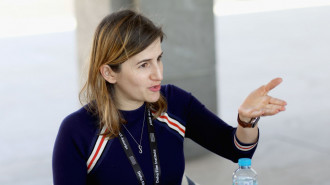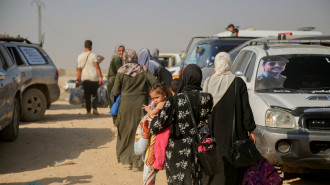Thousands of Gazan expats celebrate Eid al-Adha with families over a decade apart
For the first time in more than 15 years, Mariam Kuhail from Gaza City was able to share with her family all-day preparations for the Eid al-Adha celebration, after she spent it away for years in Canada, where she immigrated after her marriage in 2007.
"I missed this atmosphere a lot in my exile (...) I always felt that the Eid was incomplete, because I was far from my family and the festive rituals that have their own splendor in Gaza,” the 40-year-old mother of four told The New Arab, while she was in the midst of a group of women preparing Eid cakes and sweets.
"When I got married, I was a young lady, but I came back I still feel that I am that child who left her home yesterday and returned to it quickly because of her great longing".
Mariam and her six-member family spent about 48 hours on their way back from Cairo Airport to the Rafah crossing, amid complicated Egyptian procedures.
“The situation of the way has completely changed,” the woman said, adding that "when I traveled from Gaza to Cairo, it only took about seven hours (...) I don't know why all these complications occur."
“Despite the fatigue and hardship, seeing my family removed all the bad things we experienced (..) I cried a lot when I entered the Gaza Strip, which differed greatly from before,” she explained.
During their years of living in Canada, Mariam and her husband, Ibrahim, used to celebrate Eid al-Adha with their family through social media, but this was the reason "for their sadness, especially since a number of their brothers became young after they were children when they left."
Mariam's husband expressed his happiness that he will be able to spend the Eid celebrations with his family in Gaza, saying, "I am very happy with my big family (..) I wish to spend our summer vacation in Gaza, as it is the most beautiful in terms of nature and people.”
The 49-year-old told The New Arab that he was very excited to see his brothers and to experience the Eid al-Adha atmosphere in Gaza.
For fifteen years, expatriate Gazan families have celebrated Eid with the absence of one of their expatriate members, and although the screens of smartphones were gathering them, they were sad because they were far from their families.
In 2007, Israel imposed a strict blockade on the Gaza Strip, while Egypt worked to close the Rafah crossing for many months, which prompted the expatriates not to risk visiting their families in the Gaza Strip, for fear of being stuck inside it for a long time and losing their jobs.
However, this Eid, conditions have changed at the crossings. Gaza City was the destination of expatriates, and dozens of them flocked to celebrate Eid with their relatives. This joy has always been postponed.
Ahead of Eid, recent weeks have witnessed the influx of dozens of expatriate families in Europe and the Gulf countries after an absence from the Gaza Strip of more than ten years. Despite the difficult road and the high cost of entering the country, they chose to spend their Eid with their families.
Radi al-Hajj from Nuseirat refugee camp in the central Gaza Strip himself could not believe that he had arrived in Gaza after an absence of 10 years, during which he was unable to visit his family due to the difficulty of the Rafah crossing.
Al-Hajj had traveled in 2012 to work as a university teaching assistant in Germany. He got married and started a family there without his parents sharing his joy. Today, Al-Hajj is back and is the father of two children.
Al-Hajj told The New Arab that “my children in Germany used to cooperate with a few friends (...) This is the first time they meet a large number of relatives at the same time, which made them ask to return to Germany at first."
"But because of the wonderful atmosphere in which my children live during the preparations for Eid, they prefer to live here and to spend as much time as possible with their grandparents," he added.
"What distinguishes Eid in Gaza is that the Gazans are characterised by very strong social relations and we do not feel any boredom during the holidays, as we exchange visits with our relatives for sure,” he explained.
For his part, Mohammed al-Asmar waited for long hours in front of the Rafah crossing gate for the exit of his son, "Mustafa", who had been away for 9 years, before being able to embrace him in the evening hours, after returning from Belgium to Gaza.
The 69-year-old father of five told The New Arab that "in the beginning, I could not believe all night that my son had slept at home for many years," adding that "my wife and I stayed all night looking at him and contemplating his features (...) He looked older than he was when he traveled from Gaza.”
A source in the Ministry of Interior in Gaza told The New Arab that more than 15,000 expatriates returned to the Gaza Strip during the past month, to spend the Eid al-Adha holiday with their families.
Usually, before the start of Eid, the Palestinians are busy with preparations to celebrate it. The men bring livestock to be slaughtered on the first day of Eid, and then they distribute the meat to relatives and the poor.
The local markets were crowded with customers who bought essential necessities such as sweets, chocolates, cakes, and new clothes for Eid.










 Follow the Middle East's top stories in English at The New Arab on Google News
Follow the Middle East's top stories in English at The New Arab on Google News


